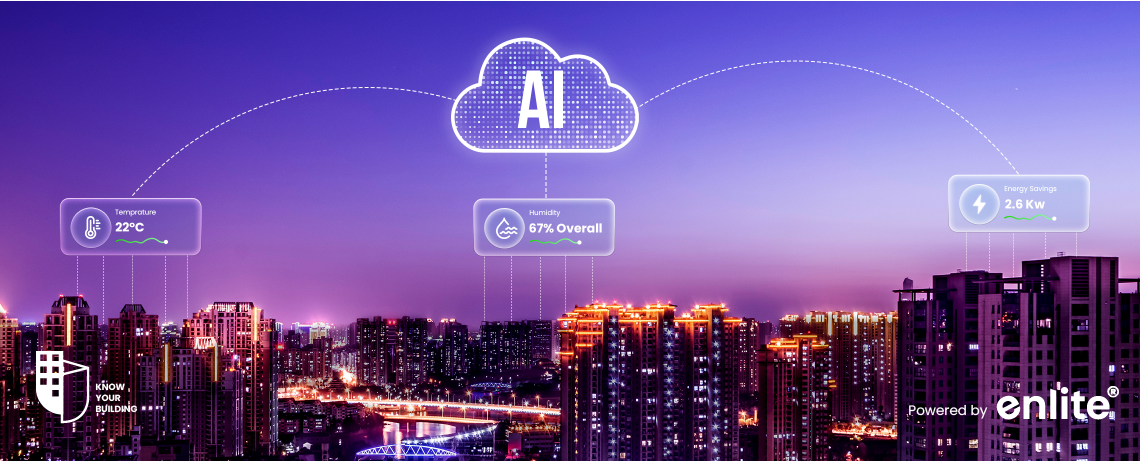In the age of modern urban development, skyscrapers have become symbols of progress and architectural excellence. However, managing the energy demands and indoor comfort of these towering structures presents significant challenges, especially when it comes to HVAC (Heating, Ventilation, and Air Conditioning) systems. High energy consumption, inconsistent airflow, and maintenance inefficiencies can impact both operational costs and sustainability goals.
This is where AI-powered Building Management Systems (BMS) step in. By combining artificial intelligence with real-time data, BMS platforms like Know Your Building® optimize HVAC performance, making skyscrapers more efficient, sustainable, and comfortable for occupants.
The Challenges of HVAC in Skyscrapers
- High Energy Demand
HVAC systems in skyscrapers account for up to 40-50% of total energy consumption, often leading to high operational costs. - Uneven Climate Control
Managing temperature consistency across hundreds of floors and zones can be challenging, causing discomfort for occupants. - Complex Maintenance
HVAC systems in large buildings require regular monitoring and maintenance. Delayed repairs or unnoticed inefficiencies can lead to energy wastage and system breakdowns. - Scalability and Centralized Control
Traditional systems lack the ability to manage HVAC operations effectively across multiple zones or buildings.
How AI-Powered BMS Optimizes HVAC Performance
AI-powered BMS platforms use advanced sensors, machine learning algorithms, and real-time data analytics to tackle the unique challenges of HVAC performance in skyscrapers. Here’s how:
- Real-Time Monitoring and Dynamic Adjustments
AI-powered BMS continuously monitors HVAC parameters like airflow, temperature, humidity, and energy consumption. By analyzing this data in real time, it automatically adjusts operations to maintain optimal indoor conditions while minimizing energy usage. - Predictive Maintenance
Using machine learning, the system identifies patterns and predicts potential HVAC failures before they occur. Proactive maintenance prevents costly breakdowns, reduces downtime, and extends equipment lifespan. - Demand-Based Climate Control
AI algorithms optimize HVAC performance based on building occupancy and usage patterns. For instance:- During peak hours, the system ensures comfort by efficiently managing temperature and airflow.
- During off-peak hours, HVAC operations are scaled down to save energy.
- Weather and Environmental Adaptability
AI-powered BMS integrates external weather data to adapt HVAC performance dynamically. On hot days, the system pre-cools specific areas, while during cooler conditions, energy use is minimized. - Zone-Based Optimization
Skyscrapers are divided into multiple zones based on floors or usage areas. AI-powered BMS provides granular control over each zone, ensuring consistent climate control while reducing energy wastage in unoccupied areas. - Energy Analytics and Reporting
The system generates actionable insights and detailed energy usage reports, helping facility managers identify inefficiencies and optimize HVAC operations further.
Why AI-Powered BMS is Ideal for Skyscrapers
Know Your Building®, a wireless, cloud-native BMS, is designed to meet the unique needs of large-scale structures like skyscrapers:
- Scalable Solutions: Effortlessly manage HVAC systems across multiple zones, floors, and even buildings.
- Centralized Control: Facility managers can monitor and control HVAC operations remotely through a unified dashboard.
- Energy Efficiency: Reduce energy consumption by automating operations and optimizing performance in real time.
- Occupant Comfort: Maintain consistent temperatures and air quality across all areas of the building.
- Sustainability Goals: Achieve ESG targets by minimizing energy wastage and reducing carbon emissions.
With Know Your Building®, skyscraper HVAC systems operate intelligently, ensuring maximum efficiency with minimal intervention.
Benefits of AI-Powered HVAC Management
- Significant Energy Savings
Intelligent automation reduces unnecessary energy usage, leading to savings of up to 30% in energy costs. - Enhanced Comfort
AI ensures optimal temperature and air quality, improving occupant comfort across all floors. - Reduced Downtime
Predictive maintenance prevents HVAC breakdowns, minimizing disruptions and repair costs. - Scalability
Easily scale operations for multi-zone management in large buildings. - Sustainability and ESG Compliance
Efficient HVAC operations reduce carbon footprints, helping skyscrapers meet global sustainability goals.
The Future of Skyscraper HVAC Management
As cities grow taller and sustainability becomes a priority, AI-powered BMS solutions are no longer optional—they are essential. Platforms like Know Your Building® are transforming HVAC systems in skyscrapers, combining intelligent automation, real-time monitoring, and predictive maintenance to optimize energy usage while ensuring occupant comfort.
By harnessing the power of AI, facility managers can ensure skyscrapers operate smarter, greener, and more efficiently—driving down costs and advancing sustainability efforts.














